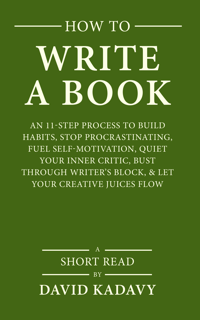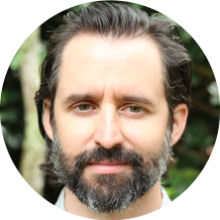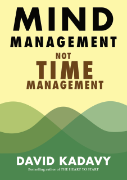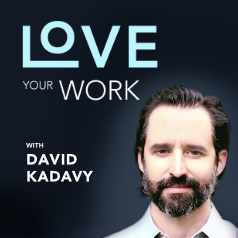Subscribe to blog updates via email »
Too Many Ideas, Must Pick One – Love Your Work, Episode 304
 Many creators and aspiring creators struggle not because they don’t have enough ideas, but because they have too many. Their situations, in summary, are “Too many ideas, must pick one.” Embedded in this belief are assumptions that, if challenged, can help you feel as if you have just enough ideas.
Many creators and aspiring creators struggle not because they don’t have enough ideas, but because they have too many. Their situations, in summary, are “Too many ideas, must pick one.” Embedded in this belief are assumptions that, if challenged, can help you feel as if you have just enough ideas.
Listen to the Podcast

WANT TO WRITE A BOOK?
Download your FREE copy of How to Write a Book »
(for a limited time)
- Listen in iTunes >>
- Download as an MP3 by right-clicking here and choosing “save as.”
- RSS feed for Love Your Work
In my recent AMA, I got a question I’m asked about creativity, probably more than any other:
How can you pick a creative project when you have too many ideas?
I’ve experienced, “too many ideas, must pick one,” many times. I still often do. I of course answered this question in the AMA, but here I’ll answer more in-depth. This is the thought process I guide myself through when I’m in the land of “too many ideas, must pick one.”
There are three assumptions embedded in, “too many ideas, must pick one.”
- All these ideas are equally likely to succeed.
- I’m equally capable of succeeding at each of these ideas.
- I can’t work on multiple ideas at once.
Let’s look at each of those.
Assumption 1: “All these ideas are equally likely to succeed”
If you feel you have too many ideas, you must think they’re equally likely to succeed, which is the first assumption. That might not sound correct at first, but think about it. If you were starving, and only allowed to eat one of various sandwiches, you would probably pick the biggest and most calorie-rich.
You might not be able to tell so easily which is the biggest and most calorie-rich sandwich. In fact, there may be other factors that play into your decision. Maybe the avocado and pork belly sandwich is the most calorie-rich, but you’re craving roasted duck in this moment, and there happens to be a roasted-duck sandwich amongst the selections.
While satisfying your hunger is one objective of choosing a sandwich, there are other goals in mind, such as satisfying cravings, which may compete with one another. If you have a hard time deciding amongst all the sandwiches, you expect eating one sandwich to be equally likely to succeed as eating any of the others.
As with projects, “success” may come in many forms. We’ll get to that in a bit.
Assumption 2: “I’m equally capable of succeeding at each of these ideas”
If you feel you have too many ideas, you must think you’re equally capable of succeeding at each of these ideas, which is the second assumption. If assumption one weren’t correct, and you didn’t feel each idea were equally likely to succeed, you would probably pick the one most likely to succeed. The avocado and pork belly sandwich would clearly be more filling than peanut butter and jelly.
Now, if you weren’t equally capable of eating each of the sandwiches, that would make your decision easier. If you’re choosing between avocado and pork belly and peanut butter and jelly, but you’re a strict vegetarian, the decision is easy. Same if you’re not a vegetarian, but allergic to peanuts.
But since you feel each idea is equally likely to succeed, and you feel you’re equally capable of succeeding at all of them, you feel you have too many ideas.
As with projects, you may have little information about your capability of succeeding, which is why, for all you know, your capability to succeed is equal across all ideas. We’ll untangle that later.
Assumption 3: “I can’t work on multiple ideas at once”
If you feel you have “too many ideas,” you feel they’re equally likely to succeed and you’re equally capable of succeeding at each of them. If you feel you “must pick one,” you feel you can’t work on multiple ideas at once, which is the third assumption.
In our sandwich scenario, you’ve been told you have to pick one sandwich. If there’s no one else around and the sandwiches will go to waste otherwise, you might as well taste all the sandwiches, then pick one. Or eat a little of each, until you’re full. But, in that case, you wouldn’t finish any of the sandwiches.
Challenging the assumptions
With all three of these assumptions, you’re in a deadlock. Your ideas are equally likely to succeed, you’re equally capable of succeeding at each, and you must pick one. Well, how can you pick one if they’re all equally appealing ideas?
There are five questions that can help you challenge these assumptions:
- What is success?
- What is my risk profile?
- What am I good at?
- What’s necessary to succeed?
- What pain do I pick?
Let’s look at each of these.
Question 1: “What is success?”
Success can come in many forms. Maybe you want to make the most money possible. Maybe you want the most freedom possible. Maybe you want to do what you’re most passionate about.
You may feel each idea is equally likely to succeed, because each idea is likely to get a different kind of success. One sandwich will fill you up, another will taste great, still another seems like the healthy choice.
If you have a clearer picture of what forms of success are more important to you than others, your many ideas will no longer be “equally likely to succeed.”
Question 2: “What is my risk profile?”
Not only can success come in many forms, it can come with various risk profiles. One idea may have a big chance of bringing you mild success. Another idea may have a small chance of bringing you wild success. The overall expected value of each idea may be the same, but the risk profiles may be very different. Some are sure bets, some are wildcards.
There are also various things you may risk in pursuing an idea. Mostly, what I call “TOM” – Time, Optionality, and Money. If you are young, healthy, and with no commitments, you have a lot of Optionality, but you might not have much Money. Making enough Money to live may take up much of your day-to-day Time. You can try a crazy idea, so long as it doesn’t take up too much Time and Money. If you fail, you’ll still have plenty of Optionality.
Or, you might want to make some changes that reduce your Optionality, but free up your Time. For example, I live in South America, which limits my options for anything requiring physical presence, but it has reduced my need for Money, thus freeing up my Time.
On the other hand, you may be in your sixties, retired after a successful career. You have plenty of Money and Time, but less Optionality than when you were in your twenties. You can only take on so many big projects in the rest of your life, and you may not have the energy you used to. But, you may feel you have nothing to lose by trying a wild idea.
If you have a clearer picture of what your risk profile is, not all your ideas will seem “equally likely to succeed.”
Question 3: “What am I good at?”
Even if all your ideas seem equally likely to fit your definition of success and fit your risk profile, you’re probably better at some things than others.
If you have a clear picture of what you’re good at, the assumption that you’re “equally capable of succeeding at each of these ideas” will no longer make sense.
It may be that you don’t know what you’re good at, likely because you don’t feel you have information to tell you what you’re good at. You probably have more information available than you think. Think about times in the past when someone was impressed with or complimented you on something you did, which came to you naturally. Or, ask your friends what they think you’re good at.
If you really don’t have information on what you’re good at, relative to your many ideas, then the third assumption, “I can’t work on multiple ideas at once,” no longer makes sense. In this case, you can and should work on multiple ideas, to get an idea what you’re good at. If you feel your ideas are too big to work on more than one, scale them back into smaller ideas. Don’t fall for “The Fortress Fallacy,” like I talked about in The Heart to Start. Instead of building a fortress, try building a cottage.
It’s important to remember that what you’re good at is not necessarily what you’re best at, nor what you most enjoy. This will make more sense as we answer the last two questions that challenge the three assumptions.
Question 4: “What’s necessary to succeed?”
In reality, you probably don’t have a clear picture of how likely all your ideas are to succeed, nor how capable you are of succeeding at each. You have to ask of each, What’s necessary to succeed?
What’s necessary to succeed at an idea is usually very different from what attracts you to the idea in the first place. You may love to play music. You may even love to play music in front of an audience. But will you love driving around the country, sleeping in a van, lugging gear, and dealing with curmudgeonly AV techs at each venue? You may love the idea of signing books for adoring fans at the local Barnes & Noble. But will you love sitting in a room by yourself, writing several hours a day?
It’s worth noting that what most people in a domain think is necessary to succeed may not be. Lots can change in the industry, and changes in the mechanics of media can open up opportunities to succeed without doing some things that were once necessary. For example, thanks to self-publishing, I don’t have to write boring book proposals or get countless rejection letters to succeed as an author.
Question 5: “What pain do I pick?”
You may be really good at what’s necessary to succeed at an idea that has a good chance of meeting your definition of success. But there may be some things necessary to succeed that you don’t enjoy. That doesn’t mean you shouldn’t pursue the idea.
No matter what you do, there will be some parts of it you aren’t crazy about – especially at first. When I was a kid, all I wanted to do was draw. But making a living at drawing as an adult doesn’t fit my risk profile, and what’s necessary to succeed would interfere with parts of my definition of success: I can’t travel if I have to lug around supplies and artwork, and if I do all my work on a computer, then I’m chained to a computer.
I didn’t used to like to write, but I found out I’m reasonably good at it. Forcing myself to write each morning was painful at first, but through building a writing habit, it’s transformed into a strangely enjoyable sort of pain.
Additionally, there are parts of making a living writing that I don’t like, or at least didn’t at first. My first one-star review shook me for days, but now I can brush them off relatively quickly. Same with angry emails from readers. I used to really hate bookkeeping, but now that I write monthly income reports, I actually look forward to tallying up my earnings.
Do you really “have too many ideas,” and must you “pick one”?
After all this, you may realize you don’t have “too many ideas,” and you don’t really have to “pick one.” If you don’t feel you have enough information to form a clear picture of the odds of success and your capability of success, even after asking these five questions, then you need more information.
You get more information not by choosing one idea, but by pursuing many. You’ll more clearly see what has a chance of succeeding and what you’re capable of succeeding at, and choosing one – or several – will become easy.
Image: Stage Landscape by Paul Klee
Join the Patreon for (new) bonus content!
I've been adding lots of new content to Patreon. Join the Patreon »
Subscribe to Love Your Work
Listen to the Podcast
- Listen in iTunes >>
- Download as an MP3 by right-clicking here and choosing “save as.”
- RSS feed for Love Your Work
Theme music: Dorena “At Sea”, from the album About Everything And More. By Arrangement with Deep Elm Records. Listen on Spotify »


